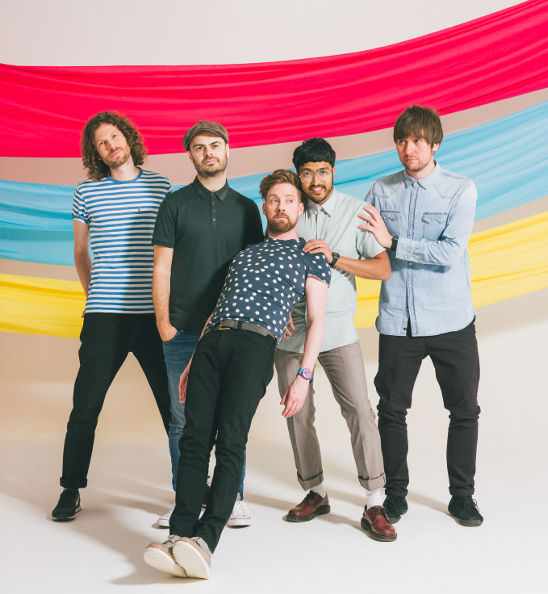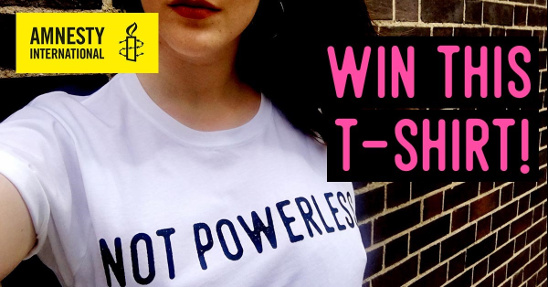Peanut from Kaiser Chiefs: Why activism is important
Not content with being multi-award winning, number one rock legends — Kaiser Chiefs want to use their worldwide fame to make a positive change in the world. That’s why they were recently one of the first musical artists to become official Amnesty International Ambassadors.
We sat down with keyboardist Peanut who has been helping us get some great shots of the young people who work and volunteer for Amnesty International. We spoke about how he got into activism, what inspires him, and how he hopes to get young people more engaged with human rights issues.
What made you become interested in activism and working with Amnesty International?
I was particularly drawn to Amnesty because it’s apolitical, which is a good thing for someone in a band and in our position, because we don’t necessarily want to be telling people what to do. I like the idea that Amnesty put out messages of what’s happening in the world and ask the individual to decide to do something about it.
Simon in our band has been a supporter of Amnesty for a while and after talking to various people within the organisation, he put it towards us as a band to be ambassadors. We get offered a lot of charity associations and partnerships but chose Amnesty because it seemed like a good way to reach people through the highlighting of terrible things that are going on around the world.
If you’re in good conscience and good mind then you will know that something needs to be done. It’s all too easy to say “I don’t agree with oppression of free speech or the use of torture”. An apolitical organisation shows that they’re not just political issues — they’re human issues. We can all act on that.
Given that Kaiser Chiefs have an audience that reaches around the world, and given that I like doing photography, it seemed like common sense to offer my photography services to Amnesty to help spread their messages.
Why do you think there’s a perception that young people aren’t engaged in politics?
The perception is actually the fact, I think. I think young people, especially leading up to the election just gone, haven’t been engaged enough. This was clearly the case when the Brexit referendum came around — the stats showed that young people just weren’t interested and didn’t turn out to the polls.
I think it’s because politics used to be seen as – even when I was growing up 20 years ago when I was at university – a system run by the older generations for the older generations. As a young person, you can feel a bit helpless when you’re against people that have had 20/30 years in politics, campaigning and lobbying, and you just don’t know how your action can make a difference to that. It all seems a bit futile.
But politics has never been as hot a topic as it is now and I think in the last few years there’s been a lot more engagement with younger generations across all kinds of issues. Young people know an awful lot more than I did when I was their age. It’s a current perception of reality and it needs to change. That’s what we’re doing with the Not Powerless campaign.

What do you think can be done to get young people more interested in activism and politics?
All movements start somewhere. It can be one person or a small group of people. And that group of people can be young people just talking about issues and making friends aware of opinions and facts.
There’s a lot of pride with politics when you start discussing it and if you don’t know all the facts you can feel a little bit ashamed sometimes or a little bit like you can’t speak out because some politician on TV is going to give you these well-rehearsed, well-versed answers that divert attention from the issue at hand. Not knowing everything is fine, asking a question that then starts a discussion is even better.
It’s about letting people know that they are the difference, individual people are the difference in the world. From one person to seven billion people, it has to start somewhere and it will always start at the smaller end.
If you can encourage and engage people they’ll carry that through their lives and when they come to hold positions of power and influence they’ll hopefully use it to better effect than the generation before us.
What gives you hope that things will change?
You can look at the polls and the election results and they’ll say one thing, but the real hope comes from the fact you can see and feel the momentum changing direction.
It seems like the message is finally getting through even to die-hard voters who have supported the same party forever - even people like that are changing, and they’re changing not necessarily because of manifestos and costings etc, but because of what they’re feeling and seeing.
When the media starts changing its tack you can’t deny that change is coming. It’s really exciting and gives you hope inside that there’s a real choice coming up that’ll mean the system changes forever.
Also, the internet and social media have given the normal person sitting at home watching the party political broadcasts and the debates the chance to get online, get on Twitter, and immediately see all the facts and reasons behind the arguments — all the myths debunked that might not be in the media's interest to reveal. It means people are much more clued up and are being treated with more respect than they ever have been. That then enables society to be better, because if you treat people better, you’ll get better out of them.
There’s also an argument that social media can be a force for bad as well in terms of things like fake news. So do you think on balance it is helping improve discourse?
Yes because I think it actually helps dispel fake news quicker. You don’t need to go to the library and get out some parliamentary report, or apply for a freedom of information request, because people will be doing that research for you all the time and sharing their information.
It helps people communicate one to one, rather than having to go through a news outlet that might have their own reasons for reporting or not reporting things. Slowly people are becoming aware of that — that maybe not everything is as straightforward, clear and plain as you see. Not that we live in some murky underworld, but there can often be economy and spin with the truth.
For example, if you want to be clued up about your constituency and your candidate you can look up in seconds how they voted on issues over the years. Whether they voted for tuition fees to be scrapped, whether they want to fight for the rights of EU nationals etc. Years ago it was much harder to access that, so there’s a lot more power that’s been given to voters to do their own research, and social media definitely helps in that respect.
There will always be people who try to abuse the system, and as much as people can be misled by social media it can also help you be more informed about the world that’s around you, and that’s really important when you’re making decisions that will shape said world by casting a vote.
What will you do?

Add your voice to millions at Amnesty International and start making a difference today.
Sign up now to win a free t-shirt and activist pack.
Our blogs are written by Amnesty International staff, volunteers and other interested individuals, to encourage debate around human rights issues. They do not necessarily represent the views of Amnesty International.
0 comments